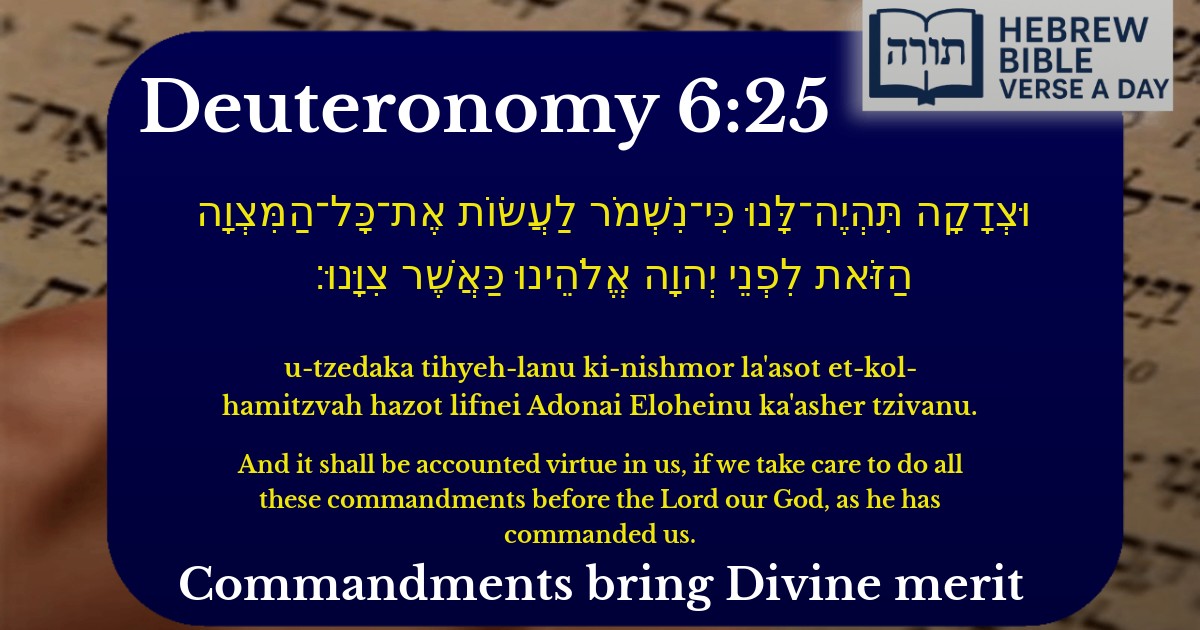Join Our Newsletter To Be Informed When New Videos Are Posted
Join the thousands of fellow Studends who rely on our videos to learn how to read the bible in Hebrew for free!
Hebrew Text
וּצְדָקָה תִּהְיֶה־לָּנוּ כִּי־נִשְׁמֹר לַעֲשׂוֹת אֶת־כָּל־הַמִּצְוָה הַזֹּאת לִפְנֵי יְהוָה אֱלֹהֵינוּ כַּאֲשֶׁר צִוָּנוּ׃
English Translation
And it shall be accounted virtue in us, if we take care to do all these commandments before the Lord our God, as he has commanded us.
Transliteration
U-tzedaka tihyeh-lanu ki-nishmor la'asot et-kol-hamitzvah hazot lifnei Adonai Eloheinu ka'asher tzivanu.
Hebrew Leining Text
וּצְדָקָ֖ה תִּֽהְיֶה־לָּ֑נוּ כִּֽי־נִשְׁמֹ֨ר לַעֲשׂ֜וֹת אֶת־כׇּל־הַמִּצְוָ֣ה הַזֹּ֗את לִפְנֵ֛י יְהֹוָ֥ה אֱלֹהֵ֖ינוּ כַּאֲשֶׁ֥ר צִוָּֽנוּ׃ {ס}
Parasha Commentary
📚 Talmud Citations
This verse is not quoted in the Talmud.


Understanding the Verse
The verse (Devarim 6:25) states: "And it shall be accounted virtue (צְדָקָה) in us, if we take care to do all these commandments before the Lord our God, as He has commanded us." This declaration follows the recitation of the Shema and the mitzvah to love Hashem with all one's heart, soul, and might. The term צְדָקָה here is interpreted in multiple ways by our sages.
Rashi's Interpretation
Rashi explains that צְדָקָה in this context refers to merit or reward. He cites the Talmud (Sanhedrin 81a), which states that fulfilling mitzvot accrues merit before Hashem. Rashi emphasizes that this merit is not automatic—it depends on our conscious effort to observe the commandments sincerely ("before the Lord our God"), rather than out of habit or societal pressure.
Rambam's Perspective
Rambam (Hilchot Teshuvah 3:4) teaches that true צְדָקָה in mitzvah observance requires proper intent (kavanah). Merely performing commandments mechanically does not fulfill the verse's demand to do them "as He has commanded us." The Rambam stresses that mitzvot must be done with awareness of their Divine origin and purpose.
Midrashic Insights
Halachic Implications
The phrase "before the Lord our God" is expounded by the Sefer HaChinuch (Mitzvah 418) to mean that mitzvot require both external action and internal devotion. One must perform commandments with the awareness that they are done in the presence of the Divine, not merely as rote behavior.
Chassidic Interpretation
The Sfat Emet (Devarim 6) teaches that צְדָקָה תִּהְיֶה־לָּנוּ implies that mitzvah observance aligns us with Divine justice. By fulfilling commandments, we become partners in sustaining the world's spiritual balance, as each mitzvah rectifies creation.